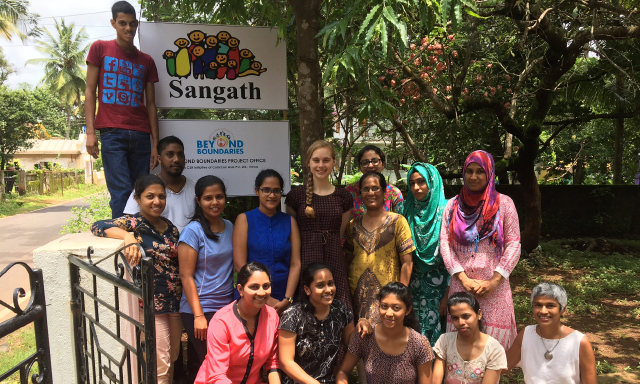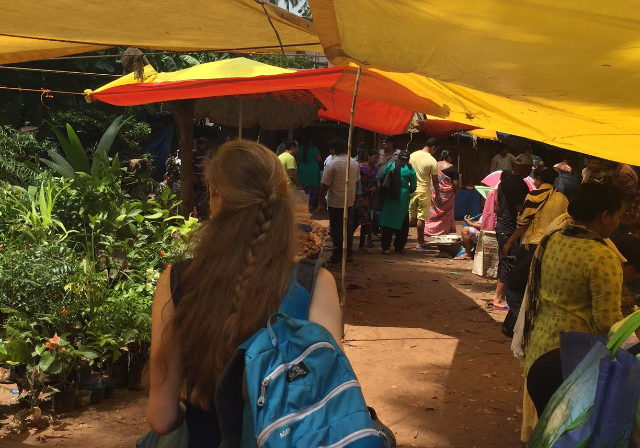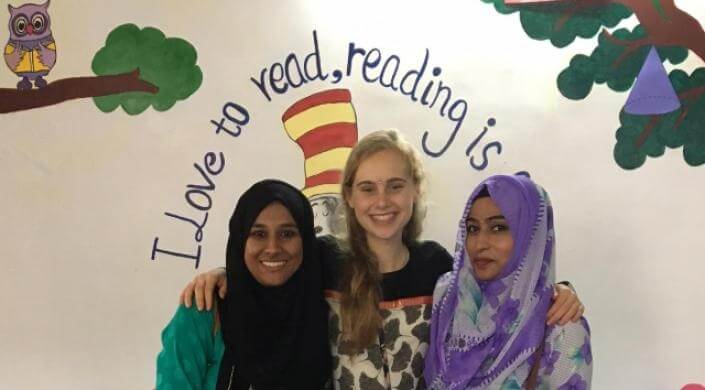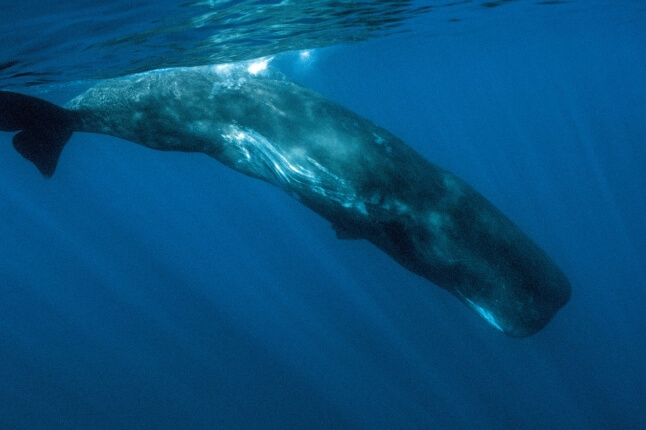News
Biomedical engineering concentrator McKenna Roberts, A.B. '19, with two teachers who work with Sangath to offer remedial classes to struggling Indian schoolchildren. (Photo provided by McKenna Roberts.)
McKenna Roberts spent her summer striving to ensure struggling Indian schoolchildren don’t fall through cracks in their nation’s education system.
Roberts, A.B. ’19, a biomedical engineering concentrator at the Harvard John A. Paulson School of Engineering and Applied Sciences (SEAS), spent two months living in Goa, a western coastal state that is home to nearly 2 million people, while an intern at Sangath, a non-governmental organization that focuses on mental health care throughout the Indian subcontinent.
Her project targeted a learning obstacle faced by many Indian students—most children attend local elementary schools taught in their native dialects, like Hindi, Konkani, or Marathi, but the curriculum in the larger middle and high schools is taught exclusively in English. To help students who need extra support, Sangath runs afternoon classes that include English lessons and interactive workshops on study skills and critical thinking.
Roberts contributed to an in-depth program evaluation, crafting surveys to evaluate students’ academic improvement and creating easy-to-use data collection and analysis resources.
“We were interested in molding these students to become self-advocates, but how do you monitor that? Will a 12-year-old give you a useful answer if you ask, ‘are you self-confident?’” she said. “Developing effective survey questions was challenging, but I enjoyed digging deeper into such a complex issue that is applicable to so many other parts of the world.”
She studied educational policy papers and pored over research on dozens of remedial education programs. Roberts used that information, coupled with her experience tutoring low-income students in Boston, to create straightforward, yet effective survey questions. Using databases, she sorted and began analyzing data collected by teachers throughout Goa.

Roberts and her Sangath colleagues worked to help struggling Indian middle school students improve their study skills and English language proficiency. (Photo provided by McKenna Roberts.)
In addition to teaching her a great deal about educational policy, the internship highlighted the challenges of implementing a data-driven analysis in the ‘real world.’ For instance, coding an algorithmic model to streamline the process wasn’t feasible.
“While it may have been helpful to have a fancy analytical tool, none of the teachers who were doing the bulk of the work were going to be able to learn ‘R’ or a specific software package,” she said. “I had to constantly keep in mind where I was and the resources I had access to. Monitoring a project in rural India is very different than monitoring the same project here in Cambridge.”
The Microsoft Excel spreadsheets and tables she built prioritize user-friendliness, an important aspect since Sangath will continue to use her tools as they spend the school year completing the evaluation.
Roberts, who is pursuing a secondary in global health and health policy, feels humbled and gratified that her contributions will help students in this developing nation achieve academic success.
“The transferability and applicability of this work to other schools made it an especially valuable project,” she said. “Every class I’ve ever sat in, there are at least a few students who don’t do as well as they could have. A program like this is an excellent way to help students figure out the challenges they face in how material is taught, and then help them overcome those challenges.”
Exploring the nuances of a vastly different school system was eye-opening, but Roberts also drew valuable lessons from living alone abroad. She faced challenges to adapt—from the constant monsoon season showers to the spotty WiFi access—but quickly fell in love with India’s rich culture and welcoming people.
“It’s impossible to overstate how valuable it is to have an experience that is so far out of your comfort zone,” she said. “The skills you build from being able to stand on your own two feet while being immersed in a different culture are useful in every career path.”

Roberts strolls through the local Saturday market where she frequently shopped for groceries. (Photo provided by McKenna Roberts.)
Topics: Bioengineering
Cutting-edge science delivered direct to your inbox.
Join the Harvard SEAS mailing list.
Press Contact
Adam Zewe | 617-496-5878 | azewe@seas.harvard.edu



